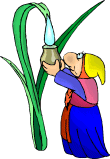

Dew
 On a cold morning we may find that grass in our garden is wet but that it has not rained during the night. This water is known as dew.
On a cold morning we may find that grass in our garden is wet but that it has not rained during the night. This water is known as dew.
Air nearly always contains some water in the form of vapour or moisture. Usually we can't see this water because it is like a gas, although when the air is humid, the weather may feel 'sticky'. Humid air contains more moisture than dry air. When the temperature of air falls however, its ability to hold moisture decreases. If the temperature drops low enough, air can become saturated, even if it was originally much drier at the warmer temperature. At this point excess moisture begins to condense, forming small water droplets on the ground called dew.
In Britain, dew is common all the year round, even in the summer. Air in Britain mostly comes from across the Atlantic Ocean and contains a lot of moisture. This means that the temperature does not have to fall very much before the air becomes saturated and excess moisture begins to form dew. Nights in Britain are generally fairly cool, and dew forms frequently.
In winter the temperature may fall below freezing. If dew has formed on the ground this will freeze forming white crystals. This is called frost.
 | Dew |
Websites
Other topics Technical Page
Technical Page
• US Weather Service
• Introduction to Weather
• Clouds
• Dew
• Energy
• Fog
• Forecasting
• Hurricanes
• Measuring Weather
• Thunderstorms
• Tornadoes
• Water Cycle
 Print Topic
Print Topic